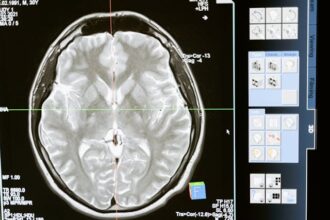Everyone undergoes the ageing process uniquely, influenced by genetics, lifestyle, and environment. Some individuals achieve exceptional longevity, reaching their 90s or even 100s in robust health without needing medications or suffering from brain diseases. But what mechanisms enable these individuals to maintain their health as they age?
Luuk de Vries, along with colleagues Dick Swaab and Inge Huitinga from Joost Verhaagen’s group, delved into brains donated to the Netherlands Brain Bank for insights. This institution houses brain tissue from over 5,000 deceased donors with a diverse array of brain diseases, making it uniquely valuable due to its comprehensive medical histories and detailed disease courses documented alongside precise neuropathological diagnoses.
Within this repository, the researchers identified a remarkable subgroup: individuals who harboured Alzheimer’s disease pathology in their brains but exhibited no clinical symptoms during their lifetime—a cohort dubbed the ‘resilient’ group. The existence of such individuals raises profound questions about the underlying mechanisms that shield them from cognitive decline when others succumb.
Luuk de Vries explains, “The molecular and cellular processes at play in these resilient individuals remain unclear. We specifically sought donors with brain abnormalities indicative of Alzheimer’s yet who did not manifest cognitive decline. We identified 12 such donors, underscoring the rarity of this phenomenon. While we suspect genetics and lifestyle play pivotal roles in resilience, the precise mechanisms elude us.”
The findings suggest that maintaining an active lifestyle, engaging in cognitive challenges, and fostering robust social connections may help delay Alzheimer’s onset. Recent research also indicates that individuals involved in cognitively demanding tasks, such as complex jobs, may accumulate more Alzheimer’s pathology before symptoms emerge. Unravelling the molecular basis of resilience could unlock new avenues for developing medications that activate processes associated with resilience in Alzheimer’s patients.
Comparing the Alzheimer’s patients with the resilient group, the researchers observed distinct gene expression patterns. Notably, astrocytes—crucial brain cells with roles akin to garbage collectors and protective shields—appeared to produce higher levels of the antioxidant metallothionein in resilient individuals. Additionally, a microglia pathway commonly implicated in Alzheimer’s pathology seemed less active in the resilient group, potentially mitigating inflammation. Furthermore, the ‘unfolded protein response’, vital for clearing toxic misfolded proteins in brain cells, showed abnormalities in Alzheimer’s patients but remained relatively normal in resilient individuals. Moreover, there were indications of increased mitochondrial density in brain cells of resilient individuals, suggesting enhanced energy production capabilities.
However, the significance of these observed differences in cellular processes remains unclear—whether they represent causes or effects of resilience against Alzheimer’s disease. As Luuk de Vries notes, “Determining which processes initiate the disease progression is challenging with human data alone. Experimental manipulations in cellular or animal models are necessary to establish causality.” This critical step is now at the forefront of their research agenda.
Understanding why some individuals evade Alzheimer’s symptoms despite possessing brain pathology holds profound implications for future therapeutic strategies. By deciphering the mechanisms underpinning resilience, researchers aim to pave the way for novel treatments that could potentially activate resilience-promoting processes in Alzheimer’s patients, offering hope for mitigating the devastating effects of this neurodegenerative disease.
More information: Luuk E. de Vries et al, Gene-expression profiling of individuals resilient to Alzheimer’s disease reveals higher expression of genes related to metallothionein and mitochondrial processes and no changes in the unfolded protein response, Acta Neuropathologica Communications. DOI: 10.1186/s40478-024-01760-9
Journal information: Acta Neuropathologica Communications Provided by Netherlands Institute for Neuroscience








